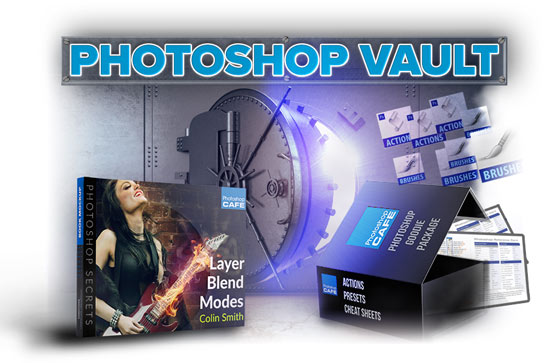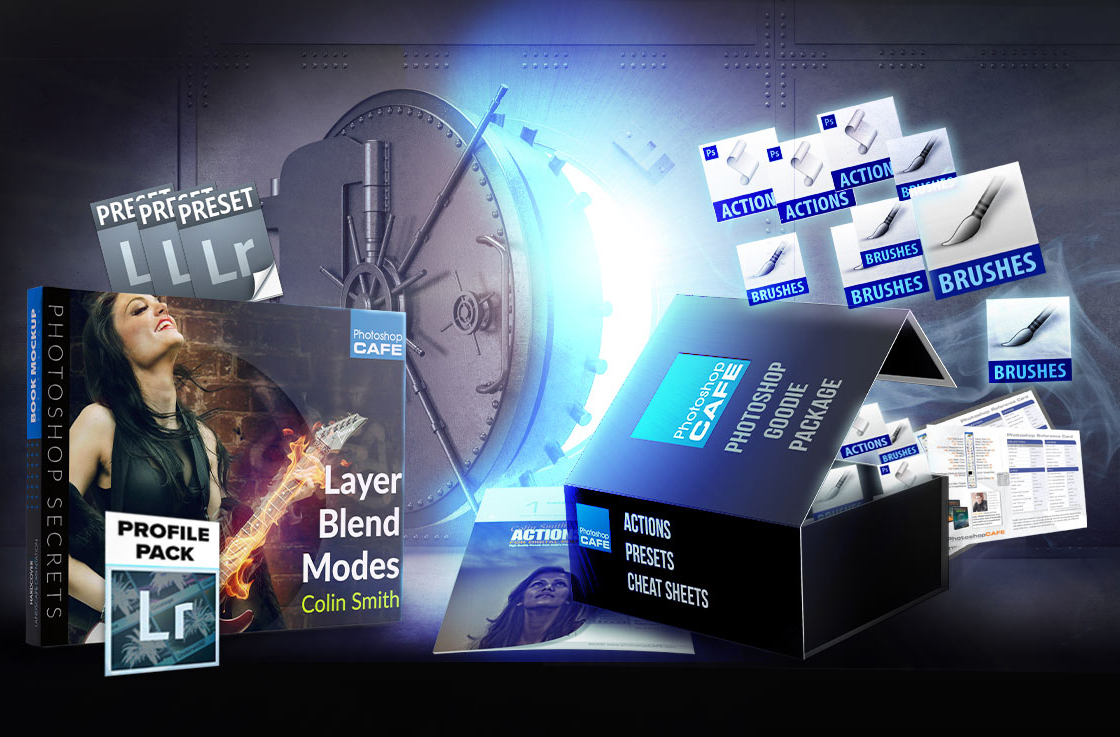Layer Blending modes are magical. This changes the way a layer reacts with the layers underneath. Blend modes have practical and creative uses. In this Photoshop tutorial, we are going to look at the 5 most useful Layer Blending modes in Photoshop.
For a more in-depth guide on all the Layer Blending modes in Photoshop, check out this article by Colin Smith (That’s me).
This is useful when you have text or images on a white sheet of paper. Perhaps you have sketches on a sheet of paper or you photographed or captured a printed sheet. The goal here is to remove the white.

You could make selections, but that wouldn’t look as good and it would take longer than this..
Where it says normal in the Layers panel, change it to Multiply.
Multiply hides white and shows black.
Now that was easy!

Now it’s time for the opposite of the previous tutorial. What if we have white on a black background and we want to hide the black background?

Choose Screen Blending mode. Screen hides Black and shows white,

Let’s look at another use for screen. Lens flares are difficult to position, but not with this trick.
Create a new layer

Fill with black: Press the D key to reset color.
Press Alt+Backspace (Option+delete) to fill with black.
Filter>Render>Lens Flare

Choose a default lens flare, or change the settings to suit your tastes.

Here is the Lens Flare applied in Photoshop

Change the Layer Blending mode to Screen in the Layers Panel.

You can now see just the Lens Flare and that black is hidden.
This method allows you to reposition the lens flare and easily see it overlaid on the image.

Here is a Layer blending mode that is often misused, which is fine, but it’s also useful to know where you can use it to its best advantage.

When you have a copy of a layer and you want to perfectly align them. (You’ll be surprised how often you will need to do this throughout your Photoshop career.)
You could drag the top layer and eyeball it, but this will help a lot to get it perfect!


Change the Layer Blending Mode to Difference
When you see the etched edge, this means it’s not quite aligned yet

Use the arrow keys on your keyboard to nudge the layer a single pixel at a time.
When you see solid black, you know the alignment is spot on.


Overlay hides gray and is useful for lots of things including dodging and burning.


Create a new Layer and fill with gray. (See a tip on the video above on how to do this easily).
Change the Blending mode to Overlay and the gray disappears.

Hold down on the Dodge tool to see the other tool options. We will use dodge (lighten) and burn (darken).

Start with the dodge tool
![]()
Paint over the areas you want to lighten, to add highlights.

Switch to the Burn tool to darken (Memory Trigger: You burn toast and it gets darker).
![]()
Paint in the shadows.

For a more detailed tutorial on dodge and burn, check this out.

Color Blending mode is really powerful. This allows to recolor an object with ease.

1. Create a new layer above your object.
2. Change to Color Blending mode.

3. Click on the color swatches at the bottom of the tool bar.
4. Choose a color. In this case, green.

5. Paint with the color
Notice how it overlays the new color. The nice thing about this is it’s non-destructive. If you hide the layer, the original colors will show.

You can even add multiple colors to have even more fun.

For more info on Layer Blending modes, download my free ebook.
Browse our hundreds of other free tutorials here, or search for what you are looking for in the search at the top of the page.
You can also browse by topics in the free tutorials menu.
If you are ready to get serious about Photoshop, see our full length courses here
PS Don’t forget to join our mailing list and follow me on Social Media>
(Ive been posting some fun Instagram and Facebook Stories lately)
Great to see you here at the CAFE,
Colin

This site uses Akismet to reduce spam. Learn how your comment data is processed.
New Remove tool option and Use Auto Selection with remove tool...
How to replace a color with color from another photo in Photoshop. Learn how to colorize an object in Photoshop...
5 of the most useful Photoshop Tips you will know! Here is a roundup of some very useful tips that...

Absolutely brilliant, Colin! I’ve never read a better explanation of how to use these Blending modes!
Thank you!
The more I watch your tutorials, the more I like them. Short, concise, easy to understand and follow-what could be better. THANKS
I use soft light most of all. It seems to give images more punch. I liked the part using ‘color.’ Have never used it before. so thanks.
I have requested the ebook on layer blends several times and not received.
Please send a support request
Great article!! Here’s my list I use everyday. All very invaluable!!
1) Color
2) Overlay
3) Soft Light
4) Multiply
5) Screen
Hi Colin, I have two favorites … Soft Light and Screen. I also use Color Burn and Color Dodge.
Great tutorial … Like the Difference and Color … those were new to me.
Dennis
Brilliant tutorial, Colin, as all your tutorials are. Love the Colour blending mode.
For some reason, when I try the color mode, it doesn’t work. I looked at your settings on screen and mine are the same. What could be the problem?
Thank you.